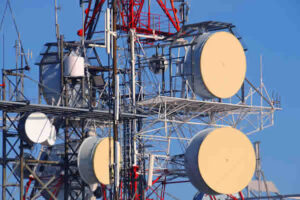Nigeria’s telecom sector is on the brink of a major disruption as approximately 800 workers from the Private Telecommunications and Communications Senior Staff Association (PTECSSAN) have gone on strike.
This action threatens to cripple services nationwide, potentially leaving millions of subscribers facing a communication blackout.
The strike, which began on Monday, has been initiated by the union, primarily consisting of contract staff.
The union’s demands include the reinstatement of dismissed workers, official recognition of the union, improved working conditions, and the remittance of membership dues.
The union described the strike as unavoidable due to the severe working conditions endured by its members and the employers’ refusal to recognize their right to unionize.
Union Secretary-General Okonu Abdullahi highlighted that the striking workers manage critical telecom infrastructure, including base stations for major companies such as IHS and Huawei.
“The impact of this strike will be substantial, as we have instructed our members to not respond to service outages.
With daily outages occurring, this will inevitably affect subscribers in the affected areas,” Abdullahi said.
The union’s members include field maintenance engineers, transmission engineers, customer service engineers, and fiber engineers.
The companies affected by the strike include Huawei Technologies Nigeria Limited, Tylium Nigeria Limited, Specific Tools & Techniques, CPNL (Chinese Pacific Networks Limited), CITCC (China International Telecommunications Construction Corporation), and JUSPARTNER.
Major telecom operators like MTN, Globacom, Airtel, and 9mobile, who own base stations and fiber infrastructure, often outsource management to these servicing companies, which in turn subcontract work to smaller contractors employing the striking workers.
This complex outsourcing structure has raised concerns about worker welfare and job security. The union had previously gone on strike in April over similar issues, which were resolved through mediation by the Ministry of Labour.
Abdullahi noted that despite the ministry’s intervention, the issues persist and have worsened with more members involved in the current strike.
“We have given ample opportunity for our demands to be addressed, but the response has been inadequate. If the situation remains unresolved, we will be forced to consider more drastic measures,” he said.

Princess Powei, the officer in charge of the telecom sector at the Ministry of Labour, acknowledged the workers’ concerns and assured that the government is committed to resolving the issues swiftly. “I will start making calls immediately to address these grievances and prevent a prolonged strike,” Powei stated.
A Huawei official, identified only as Bruce, denied that any of his team members were participating in the strike, stating that all employees were present and working. However, Bruce conceded that field workers, who are part of subcontracting teams, might be affected.
In response to previous strikes, Gbenga Adebayo, Chairman of the Association of Licensed Telecom Operators of Nigeria (ALTON), noted that the union is not recognized by ALTON and that the companies involved are not ALTON members. “We support freedom of association and are open to dialogue, but we are not familiar with this group,” Adebayo said.
The union has also reached out to ALTON in the past but has faced difficulties in establishing communication. Abdullahi mentioned efforts made to contact ALTON in 2020 and 2021, which were met with delays and excuses.
Tony Emoekpere, President of the Association of Telecommunications Companies of Nigeria (ATCON), expressed concern over the potential impact on the sector. “The telecom industry is a critical infrastructure that must be protected. Any threat to its functionality must be taken seriously to ensure the stability of this essential sector,” Emoekpere said.




